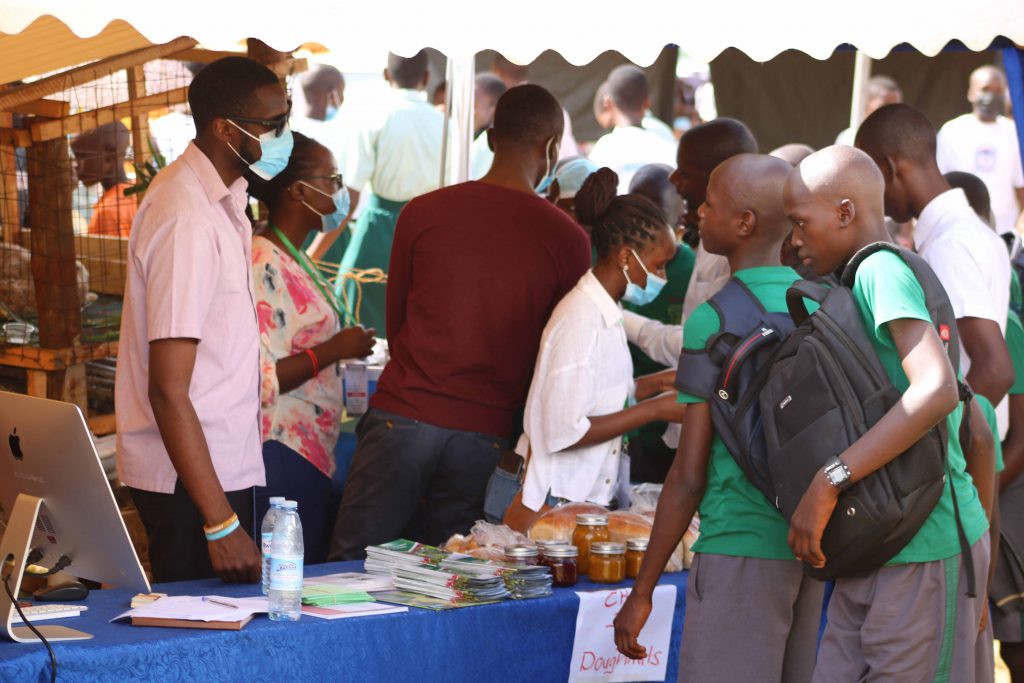By Eriah Lule
The Faculty of Agricultural Science, Uganda Christian University (UCU), participated in the inaugural Agricultural Education Show, which was held at the Jinja show grounds.
The Uganda National Farmers Federation, Operation Wealth Creation and the Ministry of Education and Sports organized the exhibition in collaboration with the Ministry of Agriculture, Animal Industry and Fisheries.
The exhibition ran on a theme: farming for a prosperous future. This exhibition, according to UNFFE, provides a platform for young people in schools (primary and secondary, farm schools, and other tertiary institutions) to showcase and compete in innovative ideas and enterprises in which they are involved both in and out of school.
The exhibition, which started on Wednesday, June 8, and ended on Sunday, June 12, attracted over 200,000 people to visit the different stalls. They attracted young agriculturalists from primary to institutions of higher learning that exhibited in different arenas of farming.
Ruth Buteme, a lecturer at the Faculty, noted that the Faculty of Agricultural Sciences equips its students with skills in sustainable food production, value addition, marketing, and research. The faculty produces graduates that are model scientists and agri-prenuers, able to identify and solve challenges in the community.

The faculty exhibited many projects, but among them was the Cricket project, where students are making use of food wastage to make food for crickets.
Petrina Kiiza, a fourth-year student pursuing a Bachelors of Food Science and Technology on this project, said that crickets are rich in nutrients like proteins and minerals and act as feed for poultry and as a delicacy in some regions of Uganda. However, the cost of feed remains a challenge to cricket farmers. Therefore, her project is aimed at formulating an alternative cricket feed through food waste material.
The faculty exhibited a rabbit-vegetable integrated urban garden system that is targeting urban farmers with limited space. The system harbors a rabbit cage and crates on the side, creating space for the growing of vegetables.
According to Ronald Mupuya, a teaching assistant at the faculty and an alumnus of the Bachelors of Agricultural Science and Entrepreneurship,
“The system helps a farmer shoot two birds with one stone; a farmer is able to earn quick money from the vegetables in the short term as the rabbits mature for sale. In addition, the rabbit excreta acts as a good source of manure for the farmer’s vegetable garden, while any waste from the vegetables can be used to feed the rabbit,” he said.
Asaba Catherine, a fourth-year student of Food Science and Technology, was also among the exhibitors. She makes both mango and strawberry jam using chia seed as a replacement for pectin, which is costly for most producers. Asaba believes that from the exposure she got from the exhibition, she has gained feedback that will enable her to better her product.
“I believe that with the ideas and feedback received, I will be able to improve my product to satisfy my customers. I also made networks with suppliers and potential customers,” she said.
Ada Nalubowa, a fourth-year student of Food Science and Technology, also exhibited her chia seed doughnuts at the show. According to Ada, Chia is a potential replacement for eggs in modern baking due to its quality and low prices.
“Some people are even allergic to eggs, but they won’t eat baked goods, which is where I come in with a solution of chia seeds to cater for people allergic to eggs but also provide an alternative ingredient,” she said.
Another product exhibited by the faculty was clean indigenous vegetable seed that has been cleaned and produced through various participatory breeding activities at the faculty.
The faculty through a number of donor funded projects continues to conduct research on indigenous vegetables so as to avail varieties that are high yielding, have a longer shelf life and are resistant to drought, disease and pest stresses. The faculty has also trained over 300 farmers and schools in small scale and commercial vegetable production for improved income and nutrition through its community engagement program. She added that the faculty hopes to become a center of excellence in vegetable breeding.
Emmanuel Igar, Assistant Academic Registrar Admissions and Student Records, stated that the faculty members who participated in this exhibition also informed the public about what UCU is doing in terms of research and student innovation.
“The faculty has networked with various exhibitors, shared knowledge and if handled well may result into increased student numbers and partnerships for future projects that will enhance the country’s agricultural sector,” Igar said.


